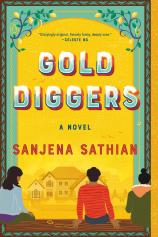Gold Diggers
Review
Gold Diggers
The setting and genre of GOLD DIGGERS drew me to it: magical realism in “Bush-era Atlanta.” The title and time of the novel made me wonder if there would be a nod to Kanye West’s 2005 smash-hit “Gold Digger,” a rap fan’s prayer that was answered in the exposition.
Protagonist Neeraj Narayan, who prefers to assimilate and go by “Neil,” eavesdrops on some broken English gossip between his mother and a fellow Indian American about the one-sided financial benefits of a marriage in their community: “Skinny-mini gold digger shouldn’t need my saris.” / “Gold digger? Kya matlab?” / “Ramya --- you know. All these kids listening to that song these days, you must keep up with them or you will lose them. Get down, girl, it goes, some such thing. Anyway...” However, Sanjena Sathian’s debut novel’s title is not dedicated to a rap song. Gold is a recurring motif for Indian Americans in GOLD DIGGERS, showcasing how they prefer the refined quality of their golden jewelry and resist the ever-American drive for quality-lessening, golden quantity.
Here is a superb example of modern magical realism, as gold’s symbolism for Indian Americans lends to the “realism” side, and gold itself is the core of its magic. The book introduces Neil promptly, but lingers in ninth grade exposition for about a fifth of the story. When Neil forcibly discovers a secret operation of his neighbors’, the Dayals, GOLD DIGGERS picks up a wonderful pace, and its plot and characters mature exponentially. Anita Dayal, Neil’s childhood friend, has grown distant, but he begins to crave this change when he learns why Anita has excelled in school and neglected him. Her mother, Anjali, knows a special lemonade recipe --- she can boil gold down into a lemonade cocktail that grants its recipients the ambition of the gold’s owner. Neil’s ultimate conflict is solved! Now he can stop being so lazy and merely coasting through school by drinking the lemonade regularly, acing his courses and racking up debate team trophies.
"GOLD DIGGERS is an excellent debut, offering insight into the Indian American experience and how to channel ambition through time."
To make the lemonade, Neil, Anita and Anjali earn themselves a share of the novel’s title: they must steal gold from ambitious people who know how to turn their hope into their goals’ fuel. They exclusively look for the gold of Indian Americans, an embodiment of the ambition, hard work and perseverance that the families of immigrants often showcase and pass down. Neil is a complex and layered character who still struggles, despite stumbling on a magical answer to his woes of purposelessness. He uses the lemonade to get through ninth grade, but not to get to anything. He doesn’t even like the debate team and only really enjoys history, a subject that his parents disregard since it won’t lead to Harvard Law or Stanford tech labs.
Sathian employs gold to represent the ambitious perseverance of Indian American families, but she doesn’t shy away from criticizing the high-pressure environment that’s often inherent with Indian American communities. Neil is haunted by an ever-present court of the American Dream: his parents love to remind him of their sacrifices to get him to the United States so he could succeed in this “land of opportunity,” which Sathian describes as a near-religious aspiration of countless Indians everywhere. Neil's social circle shares this immense pressure, with many of them also being second- or third-generation children with Indian heritage. They stick together more so out of necessity in their white-dominant, Peach State community than actually liking each other. Couple these unsound friendships with the pressure they all face, and the fierce academic and extracurricular competition between them adds to their stress.
Neil is haunted by a more disturbing ghost by the end of ninth grade: Shruti Patel’s, a nerdy but extraordinarily driven student. He recognized her ambition and took it upon himself to ask Shruti to a dance, and ended up kissing her to manipulate her into giving him a gold necklace. With another batch of his most effective and ambition-laced lemonade, Neil doesn’t realize that this process leaves the gold’s original owner with less of themselves. He also isn’t aware that Shruti’s ironclad determination in school and ability to shake off the despair of unpopularity is a cover-up for a girl crippled with academic pressure and insecurity. Anita doesn’t talk to Neil for nearly a decade after learning how his manipulating Shruti was a key factor in her suicide shortly after the dance. In those 10 years, Neil pursues studying history at Berkley, still coasting, but picking up new ways to get through the coasting and Shruti’s revenge: weed, alcohol, nicotine, MDMA, Adderall and cocaine.
Neil’s de-evolution from a sympathetic high school student to a drug-addicted, depressingly lazy graduate student is an unexpected and fascinating turn in the novel. Readers find themselves still wanting him to get his life going, but can’t help feeling that he deserves his melancholia and aimlessness. Sathian keeps Neil honest --- he doesn’t justify his unhealthy coping choices and stagnation, and he is always full of remorse for Shruti --- which keeps him away from the “unreliable narrator” title. When Anita discovers that Neil has been studying in California all this time as well, she reaches out with a mission in mind: a gold-digging mission. While trying to figure out what she wants in life, Anita has worked bridal expos, possibly the ripest spot to get her hands on the most hopeful of gold. Neil still yearns for the first drug that got him through school, and Anita informs him that the gold lemonade will help her mother, who has been plummeting into depression for the past 10 years.
Aside from a stagnating exposition and an unremarkable closing, GOLD DIGGERS is an excellent debut, offering insight into the Indian American experience and how to channel ambition through time. Time permeates the book. Progress is supposed to soothe the intangibility of the future, but Neil can’t get behind any “progress” that he makes in school. Then in college and graduate school, he can’t get over what he did in the past to make progress and solidify a future. This might be why Sathian centered the “magic” in her magical realism novel around ambition. Like love, ambition exists outside of time, offering a reason to move on from the past, persevere in the present and strive for a future.
Reviewed by Sam Johnson on April 30, 2021
Gold Diggers
- Publication Date: April 19, 2022
- Genres: Fiction, Magical Realism
- Paperback: 352 pages
- Publisher: Penguin Books
- ISBN-10: 1984882058
- ISBN-13: 9781984882059




